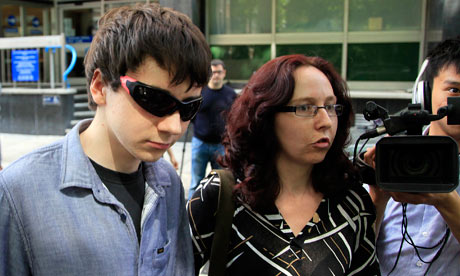The disproportionate response to hacking protests means we are in danger of leaving our future leaders behind bars

Suspected hacker Jake Davis leaves City of Westminster Magistrates Court after being released on bail on Monday. Photograph: Stefan Wermuth/Reuters
In March this year, more than 150 UK activists were arrested while occupying Fortnum & Mason in a protest against tax avoidance. They were held in cells overnight and charged with aggravated trespass. Earlier this month, the charges against all but 30 were dropped, as it emerged the chief inspector at the store had given protesters assurances they would be allowed to leave the store unhindered.
The incident generated widespread fear about crackdowns on the right to protest, against a backdrop of strikes and protests against government cuts. Similar cries have not occurred in the wake of arrests of individuals allegedly linked to the hacker collectives Anonymous andLulzSec in the UK, United States and Europe.
Yet if the criminalisation of dissent is happening anywhere, it is here.
The maximum penalty the Fortnum & Mason activists faced for aggravated trespass is three months in prison. Participating in even the simplest of hacking operations is punishable by up to 10 years in prison in the UK, and up to 20 years in the US.
Since December, Anonymous and LulzSec have engaged in a series of politically motivated hacks, often in support of WikiLeaks, including attacks taking the Visa and Mastercard websites offline in the wake of the WikiLeaks blockade, a hack on security firm HBGary revealing a proposal to Bank of America to discredit hostile journalists and activists, and attacks against the CIA and the UK's Serious and Organised Crime Agency (Soca).
The profile of many of the targets, and the frequency of attacks, may suggest a group consisting solely of master hackers, posing a great risk to the safety of nations. The truth may frequently be rather different.
Eighteen-year-old Jake Davis, alleged by UK police to be Anonymous and LulzSec spokesman Topiary, was on Sunday charged by the Metropolitan police on five counts relating to alleged involvement in attacks on Soca. One related to participating in the denial-of-service attack (a DoS, a group attack designed to take sites offline).
Three of the remaining charges relate to conspiracy to engage in such attacks – charges which again carry a 10-year tariff – while the final one is for "encouraging" such crimes to take place. Even this encouragement charge carries a maximum penalty equal to the offence involved: 10 years.
Davis is one of several individuals recently arrested in the UK. Fourteen more were recently detained in the US – several of whom are suggested to have done little more than run chat channels for the group, or participated in a small way in a few "operations".
Engaging in a DoS attack with Anonymous requires no hacking experience or know-how, and little premeditation. Would-be participants were encouraged to download a program called the "Low Orbital Ion Cannon" and follow a series of instructions – while being reassured the "chances are next to zero" of being caught. The software created a voluntary version of the "botnets" used by less political hackers to send spam mail or similar using virus-infected PCs. The whole procedure would take someone less than five minutes.
A strict interpretation of the law would suggest that even merely encouraging people on Twitter or chat channels to download the software could land hacktivists with up to 10 years in prison.
Even engaging in more serious hacking – such as SQL injection, the means believed to have been used by LulzSec to enter News International servers last week – can often be picked up and deployed from simple instructions in a matter of minutes by people with basic computer literacy.
The longest sentence so far handed out to UK protesters from the student riots was 16 months in prison for Charlie Gilmour, son of Pink Floyd guitarist David Gilmour. For one rogue retweet, any Anon could face almost eight times that.
Many could walk into such acts with their eyes closed. Anons in Germany, for example, may be aware that in their country, politically motivated DoS attacks are not illegal: following such an attack on Lufthansa in 2001, a judge ruled DoS was equivalent to a sit-in protest and so was in line with German law. But for a German, targeting a UK or US company may not be risk free.
Not everyone finds Anonymous a sympathetic crowd: some don't agree with its agenda, others its methods, others its attitude. The certainty of young activists is often unsettling – even irritating – to those with more experience of the world.
But protest, often outside the realms of the law, is a tradition of politically active youth throughout the ages. Anti-apartheid protesters moved outside legal realms, as did those in the civil rights movements, and even those pushing for women's right to vote.
Today's Marxist is tomorrow's moderate: more than one member of the last UK government was so active in such movements that the security services kept files on them.
Future political leaders are often seasoned through protest and activism. This is naturally moving online. The current draconian censorship rules criminalise dissent in this medium. Without reform, when the time comes for a new generation to take the reins, we may find all too many behind bars.


No comments:
Post a Comment